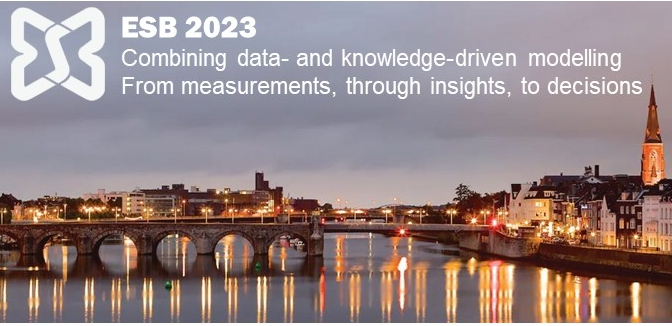On 9-12 July 2023, the city of Maastricht, Netherlands, will host the 28th Annual Congress of the European Society of Biomechanics (ESB2023, ESBiomech2023).

In such context, members of the SIMCor and InSilicoWorld consortia, including Eindhoven University of Technology (TU/e), Charité – Universitätsmedizin Berlin (CHA), Universitatea Transilvania Din Brasov (UTBV), VPH Institute (VPHi), Biotronik, ECRIN, Lynkeus, are involved in the organisation of a pre-course series focused on modelling approaches, virtual cohorts and in-silico trials for device testing. The course is open upon subscription and will take place on Sunday 9 July, from 8:30 to 18:30 CEST.
The course will encompass (1) statistical shape modelling (SSM), (2) state-of-the-art modelling approaches for device testing (AI-based and hybrid modelling) and some current applications; (3) methodologies for virtual cohort generation, multi-level validation and some use case applications; (4) status quo and future perspectives of in-silico device trials, including advantages with respect to traditional patient-based trials, strategies for mapping engineering metrics to clinical endpoints, implementation and regulatory considerations.
The course series will leverage current research in the field, as well as the work and lessons learnt from the SIMCor, InSilicoWorld and other relevant in-silico medicine projects (e.g., ScoliStorm, iHEART) .
The full programme can be summarised as below (SIMCor-related presentations available in open access):
I. Statistical shape modelling
- Lecture: Background and applications – Christophe Van Dijck (Materialise)
- What are statistical shape models
- How to build shape models?
- Applications
- Comparison to AI
- Short intro of the Mimics innovation suite: How to create SSM of a human femur? – Arsham Makaryan (Materialise)
II. AI-based and hybrid modelling: an introduction
- Lecture: Hybrid modelling – Francesco Regazzoni (Polimi)
- Use-case example: GANs for clinical data synthesis – Raji Ganesan (TU/e, InSilicoWorld)
- Use-case example: AI-based prediction of transvalvular pressure gradients in aortic stenosis – Jan Brüning (CHA)
- Use-case example: Generating synthetic aorta shapes using diffusion networks – Teodor Matei (Siemens/UTBV)
III. Virtual cohort generation, validation and application
- Lecture: Virtual cohort generation and validation: a multi-level methodology – Wouter Huberts (TU/e, SIMCor)
- Use-case example: Virtual cohort generation of aortic valve stenosis geometries – Sabine Verstraeten (TU/e, SIMCor)
- Use-case example: A statistical shape model of the porcine and human pulmonary artery for evaluation of medical devices – Jan Brüning (CHA, SIMCor)
- Use-case example: Automatic spine modelling for clinical cohorts – Joeri Kok (TU/e, ScoliStorm)
IV. From patient-based to in-silico trials: status quo and future perspectives
- Lecture: Patient-based clinical trials – Pablo Verde (ECRIN, SIMCor)
- Lecture: From engineering metrics to clinical endpoints – Andreas Arndt (Biotronik, SIMCor)
- Round table discussion: Open issues and regulatory aspects – Moderator: Liesbet Geris (KU Leuven/VPHi, SIMCor/InSilicoWorld)
Registrations are still open, by either registering to the ESB2023 online with course included, or by sending an email to ESB2023@tue.nl.
In the remaining days of the conference, the SIMCor consortium will also present some of its latest results in the following sessions:
Tuesday 11 July
- Oral session: Advanced computing for biomechanics II
- PRE-OPERATIVE RISK ASSESSMENT OF PARAVALVULAR LEAKAGE USING A COMPUTATIONAL TAVI DEPLOYMENT MODEL. M. Spanjaards, R. Ubachs, V. Lavezzo, O. Van der Sluis.
- Poster session II: Cardiovascular biomechanics
- POTENTIAL OF USING SHELL ELEMENTS METHODS IN FSI SIMULATIONS OF PULMONARY ARTERIES. H. Moradi, F. van de Vosse, W. Huberts.
Wednesday 12 July
- Oral session: Computer aided diagnosis, planning, and surgery II: Cardiac and other surgeries
- INTER-SPECIES DIFFERENCES IN PULMONARY ARTERY MORPHOMETRY AND HEMODYNAMICS. J. Brüning, N. Krüger, P. Yevtushenko, L. Goubergrits.
- Poster session III: Clinical and translational biomechanics / in silico clinical trials
- VIRTUAL COHORT GENERATION FOR IN SILICO TRIALS OF TRANSCATHETER AORTIC VALVE IMPLANTATION. S. C. F. P. M. Verstraeten, M. J. M. M. Hoeijmakers, F. N. van de Vosse, W. Huberts. This poster has also a pitch video available.